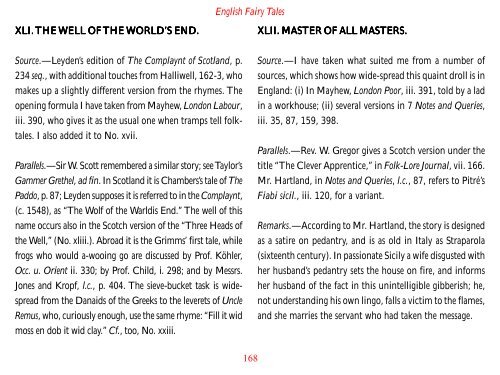Create successful ePaper yourself
Turn your PDF publications into a flip-book with our unique Google optimized e-Paper software.
<strong>English</strong> <strong>Fairy</strong> <strong>Tales</strong>XLI. THE WELL OF THE WORLD’S END.XLII. MASTER OF ALL MASTERS.Source.—Leyden’s edition of The Complaynt of Scotland, p.234 seq., with additional touches from Halliwell, 162-3, whomakes up a slightly different version from the rhymes. Theopening formula I have taken from Mayhew, London Labour,iii. 390, who gives it as the usual one when tramps tell folktales.I also added it to No. xvii.Parallels.—Sir W. Scott remembered a similar story; see Taylor’sGammer Grethel, ad fin. In Scotland it is Chambers’s tale of ThePaddo, p. 87; Leyden supposes it is referred to in the Complaynt,(c. 1548), as “The Wolf of the Warldis End.” The well of thisname occurs also in the Scotch version of the “Three Heads ofthe Well,” (No. xliii.). Abroad it is the Grimms’ first tale, whilefrogs who would a-wooing go are discussed by Prof. Köhler,Occ. u. Orient ii. 330; by Prof. Child, i. 298; and by Messrs.Jones and Kropf, l.c., p. 404. The sieve-bucket task is widespreadfrom the Danaids of the Greeks to the leverets of UncleRemus, who, curiously enough, use the same rhyme: “Fill it widmoss en dob it wid clay.” Cf., too, No. xxiii.Source.—I have taken what suited me from a number ofsources, which shows how wide-spread this quaint droll is inEngland: (i) In Mayhew, London Poor, iii. 391, told by a ladin a workhouse; (ii) several versions in 7 Notes and Queries,iii. 35, 87, 159, 398.Parallels.—Rev. W. Gregor gives a Scotch version under thetitle “The Clever Apprentice,” in Folk-Lore Journal, vii. 166.Mr. Hartland, in Notes and Queries, l.c., 87, refers to Pitré’sFiabi sicil., iii. 120, for a variant.Remarks.—According to Mr. Hartland, the story is designedas a satire on pedantry, and is as old in Italy as Straparola(sixteenth century). In passionate Sicily a wife disgusted withher husband’s pedantry sets the house on fire, and informsher husband of the fact in this unintelligible gibberish; he,not understanding his own lingo, falls a victim to the flames,and she marries the servant who had taken the message.168
















